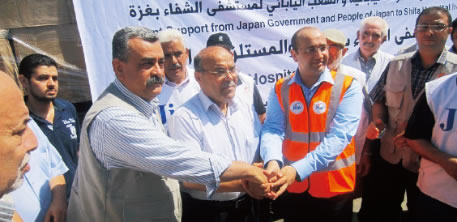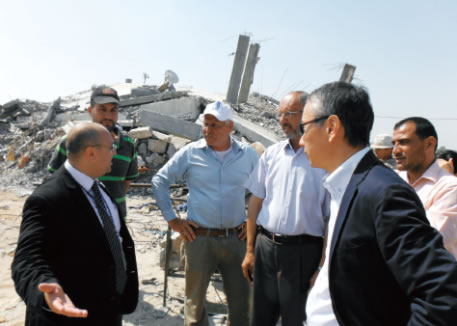Stories from the Field 06
Seeking Peace and Stability
in Gaza
– The struggle of local staff members who are supporting JICA initiatives

Presentation ceremony at Al-Shifa Hospital. From the right, Mr. Saher Younis, JICA Gaza Office staff, Dr. Al-Kashif Director General of International Cooperation, Ministry of Health and President Dr. Gharbiya JICA ex- trainees’ Alumni Association. (Photo: JICA)
Japan has been providing assistance for Palestine since 1995, aiming at peace building through the promotion of social and economic independence. Assistance projects have been implemented through the JICA Office in Gaza, the JICA Office in Tel Aviv, Israel, the Ramallah Field Office and the Jericho Field Office which is located in the West Bank.
Mr. Saher Younis is the program officer at the JICA Office in Gaza. He has been involved in Japan’s assistance projects as a local staff member since 1999, when the office was first established. His family has lived in Gaza since his grandfather’s generation. Mr. Younis was also born and raised in Gaza himself. He says that he got to know about JICA’s global assistance efforts in a lecture during his university days, which sparked his interest. After graduating from university he participated as an engineer in a grant aid project1 in 1998; on this occasion he applied to become a JICA local staff member.
Mr. Younis explains the reasons for applying in this way, “When I was working with the Japanese engineers I was surprised by how they perceive and consider things in great detail. I decided that I wanted to work with Japanese people and learn how to think like them.” When he started working for JICA, the Gaza Office still occupied just two rented rooms in a hotel.
Gaza covers an area approximately 60% the size of the 23 wards of Tokyo. It shares borders with Israel to the north and east, and Egypt to the south. It is surrounded by sea, walls, and fences, which have led it to be called the “world’s largest prison.” In 2007, when Hamas took control of Gaza by force, the Government of Israel responded by closing off the territory, severely restricting the movements of people and goods. Conflicts flared up several times in 2009, 2012 and 2014, resulting in infrastructure such as schools and hospitals being destroyed.

Mr. Saher Younis, JICA Gaza Office staff (left) and Mr. Takeshi Okubo, Ambassador for the Palestinian Affairs and Representative of Japan to Palestine (second from right) inspect the situation of Gaza. (Photo: JICA)
JICA’s assistance activities have also been significantly constrained under such circumstances. The implementation of technical cooperation projects and grant aid projects, as well as the dispatch of trainees to Japan or third countries is always fraught with tremendous difficulty.
Mr. Younis speaks about the significance of JICA’s assistance activities in Gaza in this way, “Although JICA cannot solve political problems, it is able to help to ease the suffering and damage experienced by the people of Gaza and work to improve the situation that they are surrounded by.”
One example of such assistance occurred during the conflict of 2014. Japanese assistance through JICA helped to improve the local situation, with more than 50 kinds of pharmaceutical products sent to major hospitals. At this time Mr. Younis and other local JICA staff members engaged in assistance activities wearing bulletproof vests and helmets.
After the conflict, JICA dispatched a survey team to confirm reconstruction needs. Based on the survey results, solar batteries were installed in schools and hospitals to provide electricity, and water pipes were installed to provide water for areas that previously had no water supply. In addition, efforts have also been made to develop human resources. Approximately 80 technicians in the fields of electricity and water have since been invited to Japan or Jordan to engage in JICA’s capacity building training program.
Due to the restriction of people’s movements in Gaza, dispatching technicians from Gaza to Japan and Jordan was a significant achievement. It also provided an excellent opportunity for those technicians who have been born and raised in Gaza. After returning home, they are working hard in various locations for the development of Gaza.
However, the blockade by Israel remains in place and there is still no progress towards a comprehensive peace in the Middle East. Although Mr. Younis says that Gaza is currently in a “dark period,” he has not given up hope.
“Japan is a good model for us. It managed to recover from defeat in war and also from the Great Hanshin-Awaji and Great East Japan Earthquakes. I have been able to participate in training in Japan and learn how Japan engaged in reconstruction and the peace building. That is something that I also want to tell the people of Gaza. Although we face various difficulties, as a JICA local staff member I am determined to address them directly.”
This year (2016) the Islamic University of Gaza established a Success Story Award to honor people who have contributed to the development of Gaza. Mr. Younis was selected as the recipient of the first award, and his “fight for peace” is still continuing.
*1 Grant aid is the provision of funds to developing countries aimed at developing the necessary facilities and procuring the necessary equipment to assist socio-economic development.
<< Previous Page Next Page >>
Main Text | Statistics and Reference Materials | Stories from the Field | Master Techniques from Japan to the World | ODA Topics
